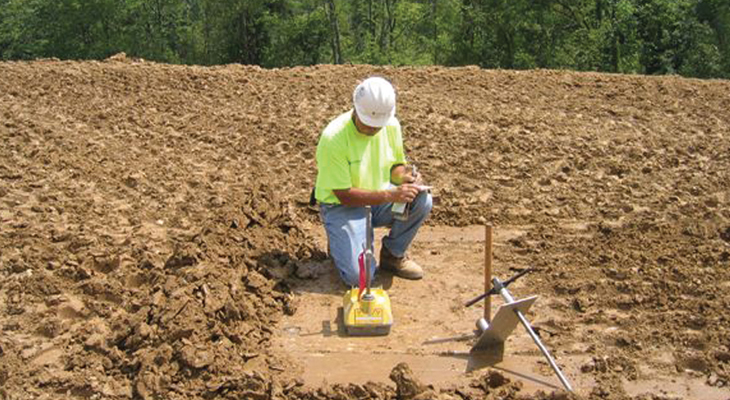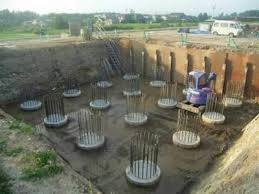Top Factors to Hire a Geotechnical Specialist for Your Construction Projects
Top Factors to Hire a Geotechnical Specialist for Your Construction Projects
Blog Article
The Importance of Geotechnical Engineering in Dealing With Ecological Challenges and Enhancing Building Safety
Geotechnical design works as a keystone in the intersection of environmental stewardship and building and construction safety, giving vital insights right into the habits of soil and rock under various problems. This discipline not just addresses pushing ecological challenges such as soil disintegration and groundwater protection but likewise improves the effectiveness of framework against natural threats. By applying calculated site examinations and customized mitigation steps, geotechnical engineers play a crucial duty in safeguarding both human lives and eco-friendly integrity. The complexities of these challenges raise important questions regarding the future direction of this area and its ramifications for lasting growth.

Role of Geotechnical Engineering
Geotechnical engineering plays an important duty in the style and building of infrastructure by resolving the actions of soil and rock materials under various conditions. This area of engineering is crucial for comprehending the communication between frameworks and the ground, which consists of establishing the load-bearing capacity of soil, evaluating security, and anticipating potential settlement or failure.
Geotechnical engineers are accountable for conducting site investigations, which include tasting and screening dirt and rock to collect information on their chemical and physical residential properties. This information is important for making foundations, keeping walls, and other earth-retaining structures that guarantee safety and security and long life. Geotechnical engineering educates the choice of suitable construction methods and materials, therefore decreasing dangers associated with dirt actions.
Moreover, the integration of geotechnical engineering principles right into metropolitan preparation and ecological management is vital for resolving difficulties such as ground contamination and groundwater monitoring. By understanding geotechnical factors, engineers can create sustainable services that boost the durability of framework against natural hazards, while also advertising environmental stewardship. Ultimately, the role of geotechnical design is crucial for attaining risk-free, durable, and ecologically mindful building practices.
Dirt Erosion Reduction
Dirt erosion poses a considerable risk to both environmental security and facilities integrity, affecting about 24 billion lots of productive soil shed every year worldwide. This phenomenon is aggravated by aspects such as deforestation, urbanization, and inadequate agricultural techniques. Geotechnical engineering plays a crucial duty in creating effective dirt disintegration reduction methods that secure both the setting and building and construction jobs.
One method involves the execution of disintegration control approaches such as plants growing, which supports dirt with root systems. Additionally, the construction of preserving walls and terraces can efficiently decrease surface runoff and shield prone areas from disintegration. Correct drain design is also crucial; it lessens water accumulation and routes excess drainage away from crucial structures.
Furthermore, geotechnical designers employ dirt stablizing methods, such as the application of geotextiles and eco-friendly floor coverings, to enhance dirt cohesion and prevent deterioration - about geotechnical engineering. Normal tracking and evaluation of erosion-prone sites allow timely interventions, making certain long-term sustainability. By incorporating these techniques, geotechnical engineering not only reduces the impacts of soil erosion yet likewise contributes to the resilience of facilities versus environmental difficulties, ultimately fostering a safer and more lasting built Go Here setting
Groundwater Security Methods
Groundwater acts as an essential resource for drinking water, farming, and commercial processes, making its protection vital for environmental sustainability and public health and wellness. Reliable groundwater defense strategies are vital in alleviating contamination threats and ensuring the longevity of this source.

Regular monitoring of groundwater high quality is additionally necessary, allowing early detection article source of contamination resources and facilitating timely remediation efforts. Utilizing advanced technologies, such as geophysical studies and remote picking up, aids in determining prospective risks to groundwater gets.
Additionally, public education and learning and stakeholder interaction are vital, promoting neighborhood assistance for groundwater security efforts. geotechnical engineer description. By combining regulatory actions, technological innovations, and community participation, we can create a thorough framework that safeguards groundwater sources while advertising sustainable development and construction techniques
Landslide Danger Management
Landslides posture significant risks to both human safety and facilities, making reliable danger administration approaches necessary. Geotechnical design plays a vital duty in determining, analyzing, and mitigating landslide dangers. A thorough understanding of incline stability, soil technicians, and hydrology is vital for establishing effective risk administration strategies.
The initial step in landslide risk management involves comprehensive website examinations, that include geological mapping and soil screening. These investigations assist engineers assess the potential for landslides by identifying crucial variables such as slope angles, dirt composition, and water material. Using advanced innovations such as remote sensing and geophysical studies can enhance the precision of these evaluations.
Once threats are identified, suitable reduction procedures can be executed. These might consist of design services such as keeping wall surfaces, water drainage systems, and incline stablizing strategies. In addition, checking systems must be established to identify indications of ground movement and modifications in water levels, enabling proactive interventions.

Enhancing Construction Safety And Security
Construction sites commonly present a myriad of threats that can endanger employee safety and job honesty. Geotechnical engineering plays an essential role in improving building security by supplying essential insights into subsurface conditions. Via extensive soil and rock analysis, geotechnical engineers can recognize possible risks, such as soil instability, groundwater issues, and seismic vulnerabilities, which might endanger the safety and security of construction activities.
Applying geotechnical services, such as proper structure design and the use of keeping frameworks, mitigates these threats significantly. These services not only ensure the stability of the frameworks being developed yet also create a more secure working environment for building and construction personnel.
Moreover, cultivating a society of security via training and adherence to established security procedures better enhances building and construction website security. By integrating geotechnical competence into the planning and implementation phases, building and construction jobs can achieve greater safety standards, eventually protecting workers and making sure successful task conclusion.
Verdict
In verdict, geotechnical design serves as a vital self-control in advertising and dealing with environmental obstacles construction safety and security. Via efficient soil erosion reduction, groundwater protection methods, and landslide risk monitoring, geotechnical designers add to the advancement of resistant infrastructure.
Geotechnical engineering offers as a foundation in the intersection of environmental stewardship and construction safety and security, offering important insights into the habits of dirt and rock under numerous problems. Geotechnical engineering notifies the choice of proper construction methods and products, therefore reducing risks connected with soil habits.
Geotechnical design Visit Website plays a critical function in creating reliable dirt disintegration reduction approaches that guard both the setting and building and construction projects.
Additionally, geotechnical designers utilize dirt stabilization techniques, such as the application of geotextiles and biodegradable mats, to improve soil cohesion and avoid destruction. With detailed dirt and rock analysis, geotechnical designers can recognize potential dangers, such as soil instability, groundwater concerns, and seismic vulnerabilities, which might jeopardize the safety and security of building and construction activities.
Report this page